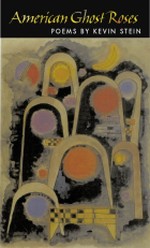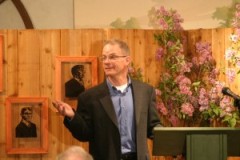Illinois Poet Laureate Kevin Stein once had very different aspirations; intent on saving the world, he was headed to law school. But when the Watergate scandal hit the news, his plans changed in a hurry.
“I noticed everyone involved—from the President on down—was a lawyer,” Stein said. Describing himself as an “idealist, wayward youth,” he instead entered graduate school focused on English. Today, as the state’s poet laureate and a Bradley University professor, Stein has different aspirations but no less noble goals: inspiring individuals, one poem at a time.
Stein, a native of Anderson, Ind., graduated from Indiana University with a master’s degree in creative writing and a Ph.D. in American literature. He joined the faculty at Bradley University in 1984 and now serves as professor of American literature as well as director of the school’s creative writing program. For his academic efforts and accomplishments as a poet, critic and editor, Stein was named Caterpillar Professor of English in 2000. Bradley has also given him its highest honors, including Bradley Faculty Member of the Year and the Samuel Rothberg Award for Professional Excellence. Married for nearly 30 years, he resides with his wife Deb and their two children in Dunlap.
Citing all of this state’s outstanding poets, especially his predecessor Gwendolyn Brooks, Stein said he was surprised to be named Illinois Poet Laureate in December 2003, but his dedicated work and obvious talent prove his worthiness.
The U.S. has roughly 37 state poets laureate as well as a national laureate, all of whom are required to create their own programs to promote poetry and, out of necessity, raise their own funds. In Illinois, Stein is required to do four readings a year.
Since he was named Illinois Poet Laureate, Stein has given 93 poetry readings, presentations and school visits throughout the state. His first project was to build what he calls a “digital poetry coffeehouse.” To that end, Stein created www.poetlaureate.il.gov, a website featuring poetry by Illinois poets, helpful advice, links to state poetry journals and websites and samples of Illinois poets’ work in written, audio and video formats. Audio and video performances have been the most popular aspects of the site. Stein proclaims it a “place to wed the world’s oldest art form with 21st century cutting edge technology.”
He also put together an audio poetry anthology of 24 state poets reading from their works—one of the first-ever anthologies focused solely on one state’s poets, according to Stein. Titled Bread & Steel, the CD acts as a record of Illinois poetry, which gives it historical value in addition to the many different voices and styles it encompasses. In addition, Stein has co-sponsored poetry contests with the Illinois Association of Teachers of English and the Illinois State Library.
A successful poet, Stein has published seven full-length books of poetry and criticism; his most recent collection is American Ghost Roses, which won the Society of Midland Authors 2005 Poetry Prize. Forthcoming in fall 2008 is his collection History’s Bicep, a poetry volume reflecting on the intersection of private and public history over the past 60 years.
While he’s considered writing fiction, Stein says his stubbornness has kept him in a genre where he can always learn more. In fact, it’s been a long journey, and he can pinpoint his first attempts at poetry. “Probably my first poems were lyrics for my junior high garage band, Puce Exit,” he said. “I couldn’t play much, couldn’t carry a tune, but I found I liked to make music with words—even if my first attempts were clumsy and sophomoric.”
 Stein’s experience being inspired and getting published lends itself well to poets of all ages. He offers the advice of the Three Rs: Read, Revise, Risk. Courage and perseverance go a long way, especially in the “slog” of writing, submitting, revising and doing it all over again for publication. In combating writer’s block, Stein recommends walking the “tightrope of arrogance and humility” in the understanding that sometimes a poem will be exceptional, and sometimes it will not.
Stein’s experience being inspired and getting published lends itself well to poets of all ages. He offers the advice of the Three Rs: Read, Revise, Risk. Courage and perseverance go a long way, especially in the “slog” of writing, submitting, revising and doing it all over again for publication. In combating writer’s block, Stein recommends walking the “tightrope of arrogance and humility” in the understanding that sometimes a poem will be exceptional, and sometimes it will not.
He also had plenty to say about being inspired as a poet: “Folks ask this question frequently because everyone wants to hear that a poet’s inspiration comes like lightning from the ether. Sorry. That happens maybe two times out of 100. Mostly, it’s from paying attention.
“That means listening to what people say, reading books, taking walks with the dog, listening to music, playing catch with my son, etc. A good writer is never not writing. One lives one’s life and tries hard to pay attention to the world around one. Then, one sits down at the writer’s desk, blank paper winking its white eye. If one’s lucky, some phrase or some musical combination of words or some quirky image appears. Then one follows it and sees where it goes.”
Stein’s end goal for poetry students and himself is discovery. “I love that “aha” moment when a student really gets it,” he shared. “I love how my students surprise me and enrich my teaching, my thinking, my life. Writing is more perspiration than inspiration, as the saying goes, but writing, good writing, is mostly discovery. You find out, as Frost said, what you didn’t know you knew.” a&s


 On Being a Nielsen Family
On Being a Nielsen Family